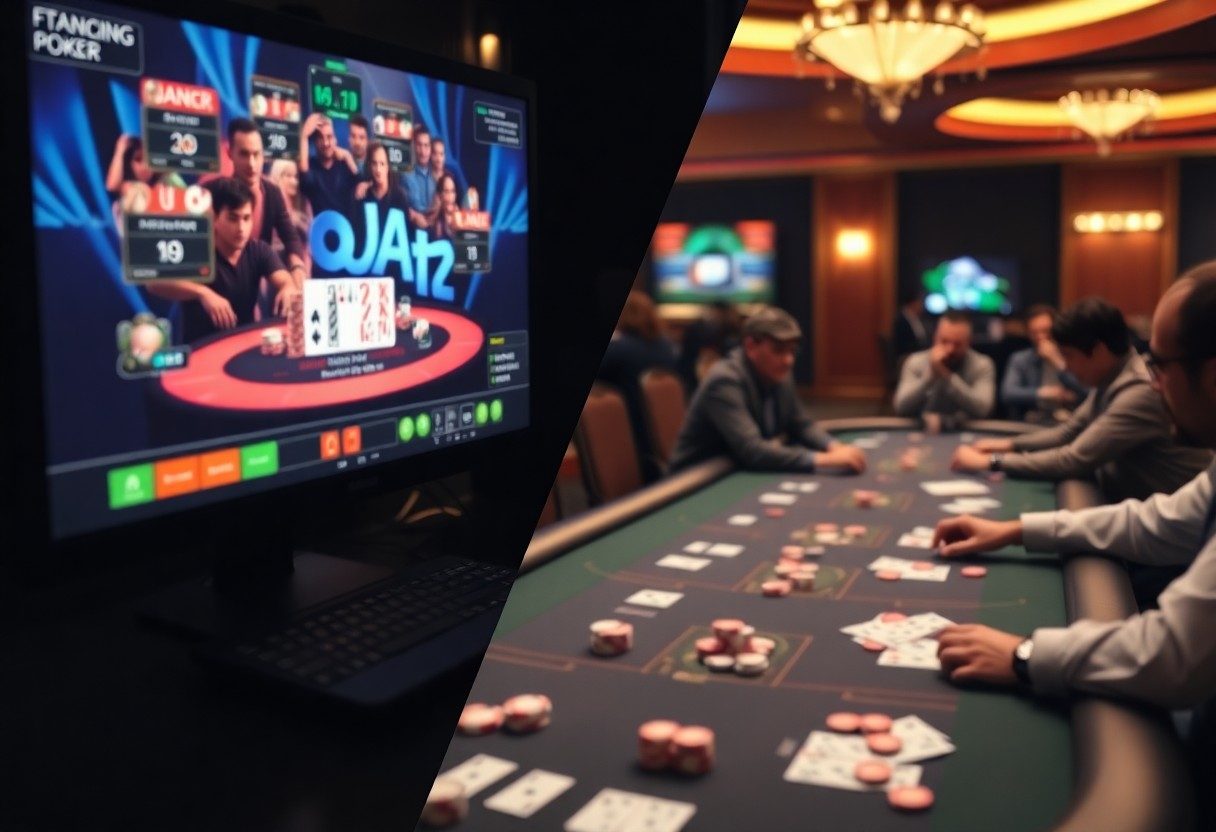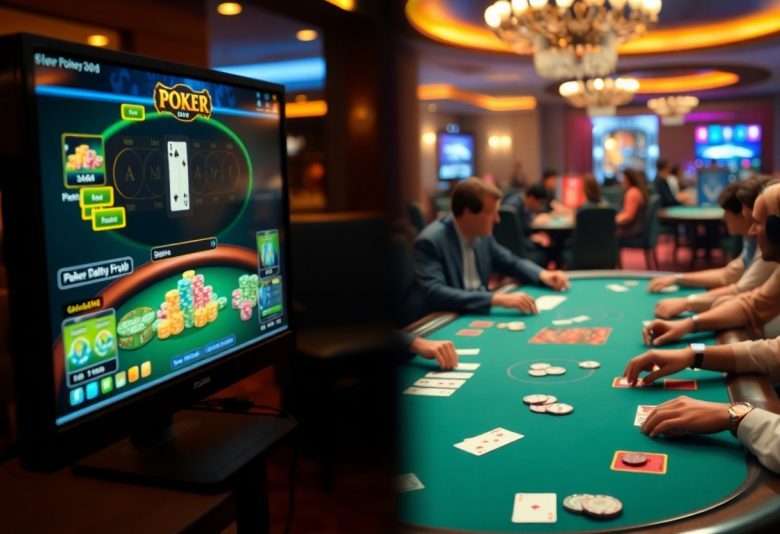Many players are unsure about the differences between online and live poker, which can significantly impact your gameplay experience. Whether you prefer the convenience of playing from home or the social interaction of a brick-and-mortar casino, understanding these distinctions is crucial for your success. Online poker offers speed and accessibility, while live poker provides a more immersive atmosphere and the chance to read your opponents face-to-face. This post will help you navigate these key differences to enhance your poker playing skills.
Gameplay Mechanics
Your experience in poker is greatly influenced by the gameplay mechanics in both online and live settings. The way you play, strategy implementation, and decision-making can vary significantly depending on the medium. Understanding these differences can help you adapt your style and enhance your overall performance at the table.
Game Pace and Action
One of the most notable differences between online and live poker is the pace of the game. Online poker games typically move at a much faster pace, allowing for quick decision-making and a higher number of hands per hour. This environment can keep you on your toes, enhancing your overall experience and forcing you to think more rapidly.
Player Interaction
Any player who enjoys the social aspect of poker will notice significant differences in player interaction. In live poker, you can engage in conversations, observe body language, and read your opponents in a more intimate setting. This dynamic often leads to a richer gaming experience compared to the more isolated nature of online play.
And while online poker lacks the face-to-face interactions, it offers its own benefits. The anonymity of online play can encourage players to take risks without the pressure of others watching. However, this also means you miss out on those subtle cues and psychological elements present in live games, making it more challenging to read your opponents. Mastering the art of observing opponents in person can provide you with a valuable edge, influencing your strategy and decisions at the table.
Player Experience
The experience of playing poker varies significantly between online and live settings. In live poker, you engage directly with other players, soaking in the energy of the casino atmosphere while enjoying the tactile feel of cards and chips. Online poker, on the other hand, offers a more solitary experience where comfort and convenience can enhance your play but may lack the excitement of in-person interactions.
Atmosphere and Environment
Before you probe your next game, consider the different atmospheres created by online and live formats. Live poker events are often filled with the hustle and bustle of a casino, where the sounds of shuffling chips and table chatter create an electrifying environment. In contrast, online poker allows you to play in a comfortable setting, free from distractions, but may lack the same level of excitement.
Social Factors
The social dynamics of poker are significant, impacting your overall experience and strategy. While live poker fosters interactions through verbal communication and body language, online play relies heavily on digital chat and avatars, creating a different kind of relationship. You might find that both formats have unique social elements that influence your gameplay. Consider aspects such as:
- Interaction with other players
- Building relationships over time
- Distraction factors in live games
- Online anonymity and its effects
Thou may find that the social aspect of poker plays a significant role in your enjoyment and skill development.
Social interactions in poker can impact your gameplay significantly. In a live setting, gauging your opponents’ reactions enhances your understanding of their strategies, while online play can lead to a more isolated feeling. Navigating these social components is vital for an enjoyable experience, as it can influence your decisions and enjoyment. Consider these factors:
- Table talk and its strategic value
- Personal connections enriching your experience
- Networking opportunities in live settings
- Online communities enhancing engagement
Thou should weigh your preferences for social interaction when choosing between online and live poker experiences.
Accessibility and Convenience
Now, when considering online vs live poker, one of the standout differences is accessibility and convenience. Online poker allows you to play from the comfort of your home or anywhere with an internet connection, eliminating the need to travel to a physical casino. This level of accessibility makes it easier for you to join games at your convenience, fitting poker sessions into your busy schedule with ease.
Platform Availability
Convenience is further amplified by the variety of platforms available for online poker. You can access numerous poker sites from your desktop, tablet, or smartphone, giving you the freedom to play whenever and wherever you choose. This flexibility means that you are not limited to the games available at a single casino, vastly expanding your options and opportunities for play.
Schedule Flexibility
For many players, the ability to choose when you want to play is a significant advantage of online poker. Unlike live games, which are often scheduled at specific times, online platforms offer a constant flow of games, allowing you to pick a time that suits you best.
Even with busy schedules, you can enjoy poker at your convenience. Online games are available 24/7, meaning you can drop in for a quick hand or play for hours, all at your leisure. This flexibility empowers you to engage in poker without the need to adhere to strict time constraints or the location limitations of a physical venue. For those with unpredictable schedules or personal commitments, online poker represents an opportunity to enjoy your favorite game while accommodating your lifestyle.
Skill Level and Strategy
Keep in mind that the skill level and strategy you employ can vary significantly between online and live poker. In online poker, you may encounter a broader range of players, which can either elevate or challenge your game. The speed and technology of online platforms require you to adapt your strategies quickly, whereas live poker allows for more nuanced reads on opponents and slower-paced decision-making.
Learning Curves
Behind every successful poker player is a unique learning curve that’s influenced by the format they choose. In online poker, the rapid pace can lead to a steeper learning curve as you encounter a variety of situations in a shorter time frame. Meanwhile, live poker offers a different kind of education, where reading body language and understanding tells become crucial skills that develop more slowly over time.
Tactics and Techniques
Between online and live poker, the tactics and techniques you adopt will differ greatly. In online play, understanding software tools and analyzing statistics can significantly enhance your game. Conversely, live poker often relies on psychological tactics such as bluffing and reading your opponents, as you must utilize every physical cue available to you.
With online poker, you should focus on your multitasking abilities and quick decision-making skills, enabling you to manage multiple tables efficiently. In contrast, live poker allows you to cultivate a deeper understanding of player psychology through extended interactions. Mastering live techniques such as timing your bets or observing physical reactions can provide you with an edge that technology cannot replicate. Balancing these elements will elevate your game in both formats.

Financial Aspects
Many players find that the financial dynamics of online and live poker differ significantly. While both formats require an understanding of bankroll management, the cost structures and potential earnings present unique challenges and opportunities. Knowing these differences can help you make informed decisions on where to focus your play.
Costs of Play
An vital aspect of your poker experience is understanding the costs associated with playing both online and live games. Online poker often comes with lower overhead, generally featuring reduced buy-ins and the ability to play multiple tables simultaneously. In contrast, live poker entails additional expenses such as travel, tipping dealers, and food, which can substantially elevate your overall costs.
Potential Earnings
Between online and live poker, your potential earnings can vary significantly due to the player’s skill level and the game type. Online poker often allows for a faster pace, enabling you to generate more hands per hour, but the competition may be stiffer. In contrast, live poker can offer lucrative opportunities with larger tournament buy-ins and payouts but tends to be slower.
The earning potential in poker largely depends on how you navigate the landscape of each format. Online, you can capitalize on multi-tabling, which can amplify your profits exponentially if you are skilled enough. Conversely, live poker typically features larger cash prizes in major tournaments, but you may encounter higher variance with longer sessions. Balancing these factors based on your skillset and financial goals will greatly enhance your overall profitability in both formats.
Security and Fairness
Once again, one of the most significant differences between online and live poker is how security and fairness are managed. In the online realm, players can have concerns about the integrity of the games they participate in, while live poker offers more transparency in terms of card handling and dealer interaction. Understanding how both environments ensure secure gameplay is vital for any player looking to improve their game.
Regulation and Oversight
To ensure safe and fair gameplay, regulated online poker platforms adhere to strict laws and guidelines, often set by gaming commissions. These regulations help maintain a level playing field for all players, providing you with assurance that the games are legitimate and monitored for any fraudulent activity.
Fair Play Measures
By implementing various fair play measures, online poker sites work to create an equitable gaming environment. These include random number generators, player tracking software, and active monitoring for collusion or cheating. Ensuring fairness is not just a priority, but an ongoing responsibility for online platforms.
For instance, random number generators (RNGs) are employed by online poker sites to guarantee that card dealing is completely random and unbiased. Additionally, player tracking software is used to detect unusual patterns that may indicate collusion, safeguarding the interests of honest players. Regular audits by independent organizations also contribute to maintaining integrity in games, enabling you to feel secure and confident in your gameplay experience.
Final Words
Following this exploration of online versus live poker, you should now have a clearer understanding of the key differences that can impact your gameplay experience. Whether you prefer the convenience of online poker or the social atmosphere of live games, being aware of factors like pace, player interaction, and strategy variations will enhance your decision-making. Ultimately, choosing the right format for you can significantly influence your enjoyment and success at the tables, so weigh these aspects carefully before diving in.




